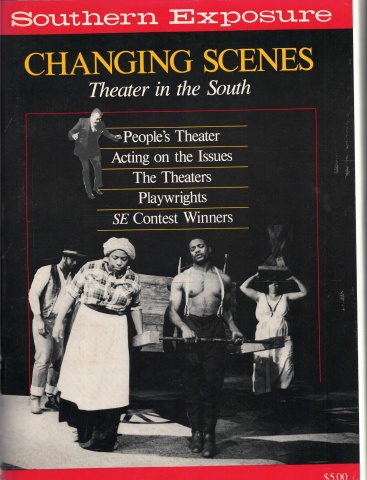
This article originally appeared in Southern Exposure Vol. 14 No. 3/4, "Changing Scenes: Theater in the South." Find more from that issue here.
Del Hamilton is a risk-taker. As artistic director of Atlanta's Seven Stages theater — a group committed to producing new plays — Hamilton takes pride in giving a voice to many writers whose work "would not be possible in institutionalized theaters." Such plays often do not appeal to traditional funding sources or traditional theater patrons.
But Seven Stages succeeds because it has linked itself to the surrounding community. Begun in 1979 in a small storefront, Seven Stages is located in a transitional neighborhood. Its neighbors include several theaters, bars, vintage clothing stores, pizza joints, and a bookstore. In addition to producing new plays, Seven Stages has also become a forum for local artists to do readings of new plays and poetry or even to gather for a covered-dish Thanksgiving dinner.
When Hamilton discovers a project that he thinks would be valuable for the community, he includes it in his plans for the theater. For example, this past year Seven Stages offered a women's series of concerts, poetry readings, and workshops through a series titled Women's Voices. Included in this series were works by Kay Gardner, Odetta, Minnie Bruce Pratt, June Jordan, and Adrienne Torf. As an outgrowth of the series, Seven Stages also recently produced the world premiere of a new musical, Bang Bang Uber Alles, a collaborative effort between June Jordan and Adrienne Torf that explores the social and political responsibilities of the artist. In the play, a group of artists decides to take a stand against the Ku Klux Klan. When the show opened June 14, about a dozen Klan members staged a demonstration outside the theater.
Hamilton says, "Our management and programming have become responsive to who is currently among us to continue the work. In this sense we have become truly radical, truly experimental. The experiment, which is not unlike a scientist's search for truth, has now led us to a deepening awareness that the work responds to the people who create it as much as it is a result of those who planned it."
During the past seven years, the theater has produced an abundance of new plays, as well as classics, musicals, and a number of Sam Shepard plays. While some of the plays failed to draw audiences, a few couldn't accommodate the crowds anxious to buy tickets.
Hamilton is also working to build a global community of theater artists. When he became aware of the work of South African playwright Adam Small, Seven Stages produced his Kanna — He is Coming Home, with Small in residence. The 1986-87 season includes two more plays by Small. Hamilton and Michael Keck, an Atlanta musician and actor, are working with Small on a new play. The South African government recently declined to issue visas for the two Americans to make a scheduled trip to the country to continue the collaboration with Small.
Hamilton has forged other international connections, including some with German artists. Through the Goethe Institute in Atlanta, Hamilton and Faye Allen, another Seven Stages staff member, traveled to Germany to study theater there. The visit was returned this spring when writers and critics from Berlin spent a few days in Atlanta watching rehearsals and sharing ideas from current theater activity in Germany with the local community.

